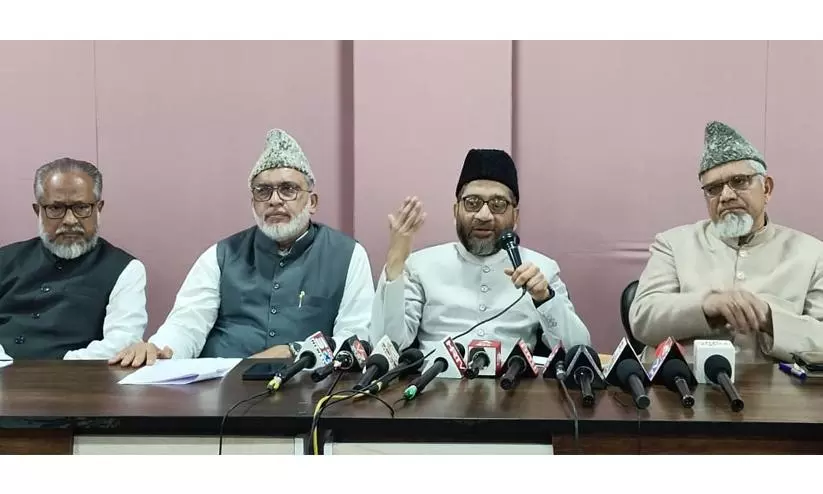
JIH conclave resolutions address key issues, including the waqf bill, economic disparity
text_fieldsThe All-India Members Conclave of Jamaat-e-Islami Hind (JIH), held in Hyderabad from 15 to 17 November 2024, concluded with a strong focus on national, community, and international issues.
Attended by 15,000 members, the three-day event featured detailed deliberations on social, economic, educational, and moral challenges facing the nation and the global community. Resolutions adopted at the gathering outlined the organisation's commitment to fostering peace, justice, and inclusive development.
National challenges: rising concerns over justice and communal harmony
The conclave expressed deep concern about the deteriorating conditions for Muslims in India, highlighting the increasing communal aggression and targeting of individuals, institutions, and places of worship. Delegates pointed to the misuse of legal complexities, illegal demolitions, and acts of violence, which they argued reflect a growing wave of hatred. The conclave also criticised the slow pace of judicial proceedings, noting that this undermines the rule of law and justice.
Particular emphasis was placed on state actions disregarding Supreme Court directives, such as the use of bulldozers for demolition drives. Participants warned that unchecked hatred and divisive agendas threaten not only the Muslim community but the integrity of the nation as a whole.
A strong rejection of the proposed Waqf Bill was included in the resolutions. The conclave accused the bill of undermining public interests and Muslim community resources. JIH praised efforts by Muslims and other stakeholders to highlight the bill's flaws and demanded its complete withdrawal, asserting that it is inconsistent with public sentiment and justice.
The gathering commended individuals and organisations advocating for justice across India, recognising their efforts as vital to countering injustice. JIH called for stronger alliances between Muslims and other communities to foster trust, cooperation, and unity in the fight against divisive forces.
A call to resilience and reform
In addressing Indian Muslims directly, the conclave emphasised the importance of unity and steadfastness in the face of adversity. Participants urged the community to trust in Allah, avoid despair, and remain committed to justice and fairness. Muslims were encouraged to counter false propaganda against Islam through planned and systematic efforts to provide accurate information and build bridges with fellow citizens.
The resolutions also advised Muslims to prioritise social, political, and judicial reforms while avoiding reactive responses to provocation. Members highlighted the need for patience, courage, and a character of peace while striving for positive change. Despite current challenges, the conclave called on the community to actively contribute to the nation’s progress, ensuring that temporary hardships do not distract from long-term goals.
Economic inequality and societal decay
The conclave expressed alarm over rising economic disparities and the concentration of wealth among a small elite, which it attributed to flawed government policies. It highlighted the growing gap between the wealthy and the poor, with the latter facing worsening conditions of poverty and exploitation. Participants identified systemic corruption, communal aggression, and authoritarian tendencies as key obstacles to progress and peace.
Concerns were raised about the declining state of constitutional institutions and the erosion of democratic values. The resolutions criticised the influence of extremist ideologies on the media and education systems, warning that this fosters biases and undermines intellectual development.
The gathering also addressed the nation’s moral crisis, particularly regarding the safety and dignity of women. Delegates lamented the lack of accountability for crimes against women, arguing that this emboldens offenders and contributes to societal moral decay. They called for urgent measures to restore justice and uphold moral integrity in the country.
An appeal for unity and real solutions
Calling on all citizens, the conclave urged collective action against hatred, division, and polarisation. It emphasised the need to address real issues such as corruption, inequality, and exploitation rather than allowing divisive agendas to dominate public discourse. The resolutions appealed for solidarity among communities to protect the nation’s integrity and work towards shared progress.
Global concerns: Gaza, Palestine, and international conflicts
On the international stage, the conclave strongly condemned the ongoing violence in Gaza, describing it as a genocide and one of the worst crimes against humanity in modern times. Delegates praised the resilience of Palestinians, particularly in Gaza, and saluted their courage in standing against oppression.
The gathering urged the Indian government to reinforce its historical stance of supporting Palestinian rights and to take stronger measures in advocating for an end to the violence. Military assistance to Israel was criticised as a violation of India’s long-standing anti-colonial policies. The conclave reiterated its demand for a complete cessation of arms sales to Israel and called for active diplomatic efforts to bring peace to the region.
The conclave also condemned the ongoing Russia-Ukraine war and escalating tensions in Central Asia, accusing arms manufacturers of exploiting conflicts for profit. Delegates appealed to global institutions to prioritise humanity and justice over political and economic interests, urging them to hold perpetrators of war crimes accountable.
Responsibility of Muslim nations
Muslim leaders worldwide were urged to step forward in assisting oppressed communities, guided by Islamic fraternity and moral responsibility. The conclave called on these leaders to raise their voices against injustice and awaken global public opinion against oppression. It emphasised the importance of leveraging collective influence to bring about meaningful change and uphold the principles of justice and human rights.






















